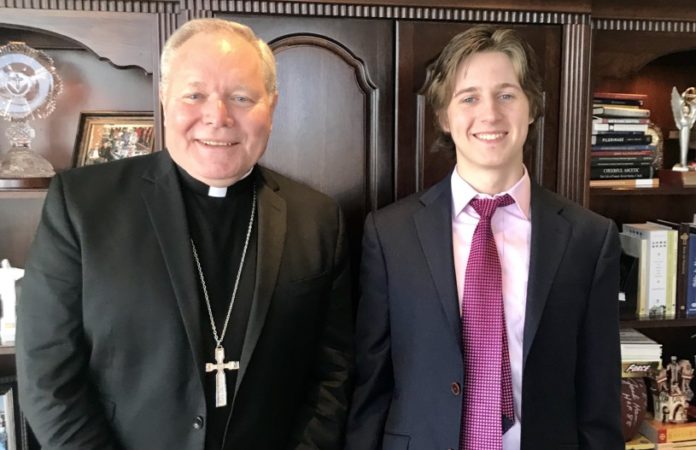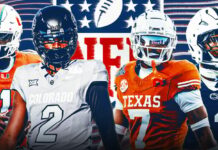A core reason why many of us attend Jesuit is due to the school’s excellent faith-based education. The Jesuit “Profile of the Graduate” describes the characteristics of a man who ‘seeks the fullest development of his God-given talents and puts his faith in action.’ That’s a lofty aspiration that inspired me, so I was interested to learn more about the views of our most senior local spiritual leader, His Excellency Bishop Burns.
As a relative newcomer to Dallas, not many of us know much about this interesting and jovial man of the cloth, who was kind enough to share some of his unique background and core beliefs with me recently.
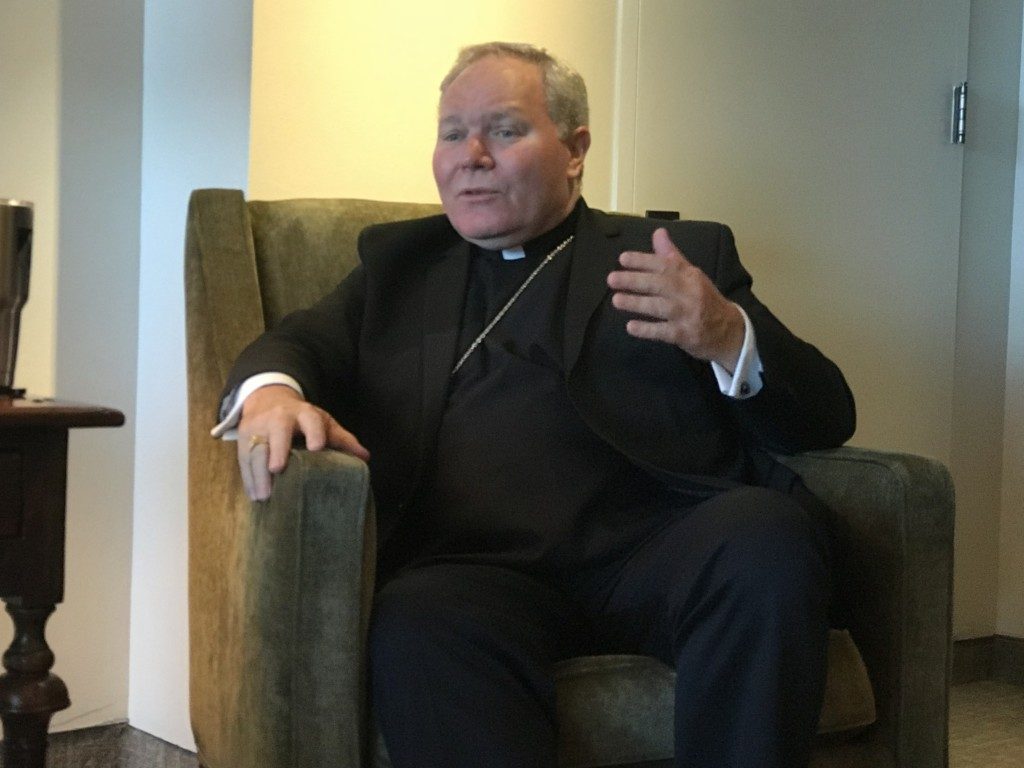
What made you want to become a priest?
“Without a doubt, it was mysterious in a way in which I tried to put it off a lot. I felt ‘the call,’ but there was a part of me doubting myself saying that I wouldn’t really be called to serve in the faith. It seemed to me that priests are a different kind of people. I suppose I had a preconceived notion of what a priest was. And I really questioned if I fit into that category. So I tried to push it off, but later decided to at least explore the priestly vocation. My vocation didn’t unfold instantly before me, rather it unfolded over time. And it continues to unfold.”
Who was your biggest role model / mentor while growing up?
“I worked at the Tree of Life Synagogue doing odd jobs when I was young. The Rabbi and I would get into wonderful conversations of faith. It was a welcomed challenge to discover more about the Catholic faith, and also understand a Judeo-Christian rootedness in who we are.”
What college did you go to?
“I went to Duquesne University in Pittsburgh, Pennsylvania. After that, I went to Mount Saint Mary’s Seminary in Emmitsburg, Maryland.”
Why did you become a bishop?
“I never thought I would become a bishop. I think you’re aware that prior to being the bishop here in Dallas, Texas, I was the bishop in Juneau, Alaska. Some people ask me what I was doing before being the bishop in Juneau, and I tell them I was in Pittsburgh ‘minding my own business.’ It came as a surprise from the Vatican Ambassador that Pope Benedict had appointed me as the bishop of Juneau, Alaska. I had always thought I would have just been a parish priest in Pennsylvania. Being a bishop is very fulfilling. It’s an amazing experience. The people of the diocese of Dallas are proud to be Catholic, and I had never received a warmer welcome from a group of people. The people of Dallas are very generous and are always helping others.”
If you didn’t become a bishop, what might you have become?
“What’s interesting is that I remember I was never sure if I fit in that category of a priest. I double majored so I wouldn’t walk out of the seminary with just a philosophy degree. Most likely, I would have entered into law school and became a lawyer if I didn’t become a priest and later a bishop.”
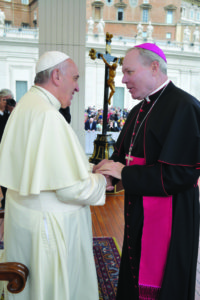
What has changed now that you’re a bishop versus when you were a priest?
“I have to say that it is wonderful being the shepherd of a diocese. It’s wonderful working with my brother priests. I really welcome the opportunity of inviting young men to consider joining the priesthood. We have over 85 seminarians in the diocese of Dallas, and they’re wonderful people. It’s great to see how people are so proud to be Catholic. As the shepherd, I’m keen on keeping that faith strong and alive. One gentlemen said to me, ‘Bishop, I have my wife and 5 children in my house. I feel the weight of the care and concern of their souls as a husband and father. I can only imagine how much 1.3 million souls in the Dallas diocese weigh.’ When you put it in that perspective, it’s definitely something that weighs on me.”
What is your favorite part about being a bishop?
“I have to say that I’m humbled to be the bishop of this diocese. I will always admire how much Cardinal Farrell did for this diocese. He did an excellent job. I’m privileged to be the bishop of Dallas. I do enjoy being with the people and the parishes.”
How much has the Church changed since you joined?
“I really think the Church has gotten stronger in its outreach to the poor and the needy. I think the Catholic social teaching plays a significant role in today’s society. Our Church is truly a voice for those who struggle, those who are unborn, and a voice for members of the immigrant community. It’s great to see that strength in the Church. I never dreamt that I would have been spending a portion of my ministry apologizing for the sins of my brother priests and brother bishops, in particular, I’m talking about the various scandals that most have heard of. I find it necessary to address the sins of the past.”
What does your typical day look like?
“Every day is different. Some days are busy with a slew of appointments, and others are quite slow. I have a chapel in my house, and the day starts with morning prayer if I don’t have Mass at one of the parishes. When it’s Confirmation season, I’m out late at night at all the different parishes. I often travel. I’m going to Washington D.C. for a meeting with other Bishops, and I plan to go to Bosnia and Ukraine with Catholic Relief Services.”
How does the Dallas diocese differ from the Juneau, Alaska diocese?
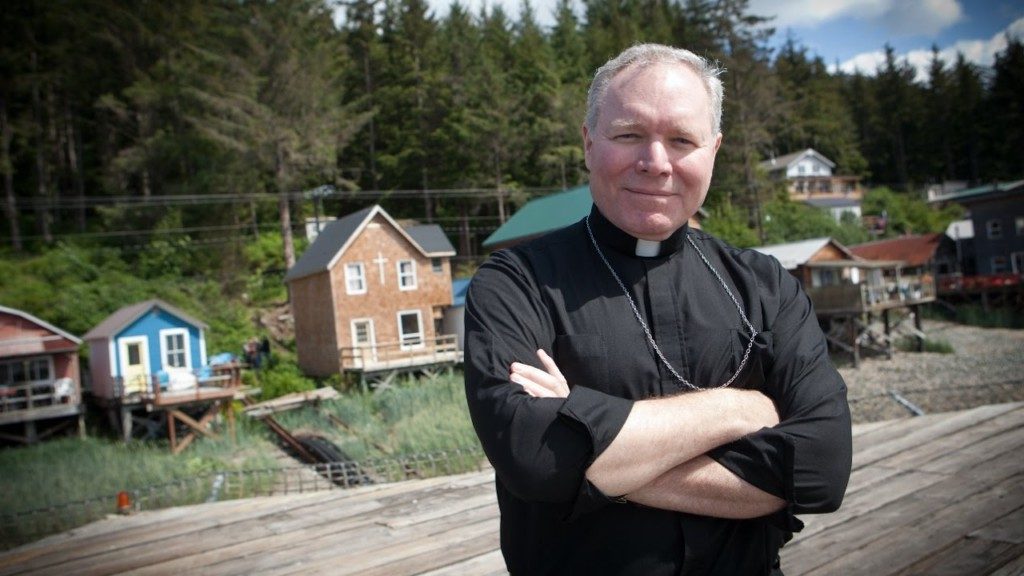
“The diocese of Juneau has over a thousand islands. There are parishes and communities spread out over those many islands, and it’s very isolated. There are no roads in Juneau. You can only get in by air or by water. When I came to Dallas, its all roads, no islands! The one thing that’s similar between Juneau and Dallas is that travel is a challenge in both places. The size is a significant difference.
The diocese of Juneau has about 10,000 Catholics and 9 priests. In Dallas, we have 1.3 million Catholics and about 185 priests. In Juneau, I had the best parishioner to priest ratio in the country. In Dallas, I have almost the lowest priest to parishioners ratio in the country. The challenge in Juneau is that the Catholic community is only 10% of the overall population, and we were the largest faith community. That is because over 50% of the overall population is “unchurched.”
That doesn’t mean they had never heard of Jesus Christ or the Gospel — it’s that they chose to be secularists. I found it as a real challenge to spread the new Evangelization and the Catholic faith. Another difference between Juneau and Dallas is it rains constantly! There are only 60 days of sunshine a year. Whenever it became sunny, people would take a day off.”
From your perspective, what’s the most immediate issue that needs to be addressed in today’s society?
“I am absolutely concerned about the lack of civility in today’s society. I’m embarrassed that the lack of civility that penetrates the sports industry, the media and entertainment industry, and politics. I think there is a lack of respect for others, a lack of respect for human dignity, and a lack of respect for the sacredness of human life.
Life is sacred from the moment of conception until natural death. The lack of respect for human dignity demonstrated at the borders is appalling. I will agree that every country has a right to protect its borders, but it is in our DNA to help those who have a right to a better life. If you look at our country, you see that the inscription on the Statue of Liberty says ‘Give me your tired, your poor, your huddled masses who long to breath free. I hold my lamp next to the golden door.’
We as Catholics have to recognize that our Lord was an immigrant as well. He crossed from the divine to the human. He became one of us. While here as a child, Joseph took Mary and Jesus to Egypt to flee from Herod.”
Have you ever experienced a miracle, and if so, will you share your experience?
“I would have to identify a miracle as truly seeing God at work in our midst. What I have experienced with God’s intervention and interaction in my life has been through others. I am amazed when somebody will come up to me and say, ‘You don’t remember me, but you did this and it changed my life.’ God works through me and other people.”
A bishop seems to me like a very senior position, and perhaps not as accessible to parishioners. How would you like your office and your role to be perceived?
“I went over to Holy Trinity Grade School across the street, and visited the 3rd-grade classroom. I asked them if they knew who I was, and one girl raised her hand and said, ‘You’re the pope!’ I told them I’m the Bishop of the diocese of Dallas, and I work across the street. I invited the 3rd and 4th graders over across the street, and we had an opportunity of prayer and to teach them about the Church and how the diocese of Dallas started. Pope Francis has said that ‘It’s necessary for the bishop to smell like the sheep.’ It’s important to be present.”
What’s your favorite genre of music and your favorite song?
“Growing up in the 70s, I suppose I would gravitate towards Cat Stevens.”
What’s your favorite movie?
“ ‘Shawshank Redemption’. It’s one of those movies that if it’s on the TV in the background, I will stop what I’m doing and watch.”
What’s your favorite book?
“ ‘The Kite Runner’. It’s a powerful book.”
Who are the top 5 guests you’d like to have at your dinner table?
“My family. I have a small family, and we’re extremely close. My family is vital to me.”
Waffles or pancakes?
“Waffles!”
Anything you’d like to say to the students of Jesuit?
“I want to offer my prayers in support for all the young men at Jesuit that they truly become ‘Men for Others,’ and that they truly recognize their gifts and their talents and utilize them to the best of their ability.”
Note: Bishop Burns is contemplating officiating the coin toss for Jesuit’s first home football game. Let’s hope he can make it!


